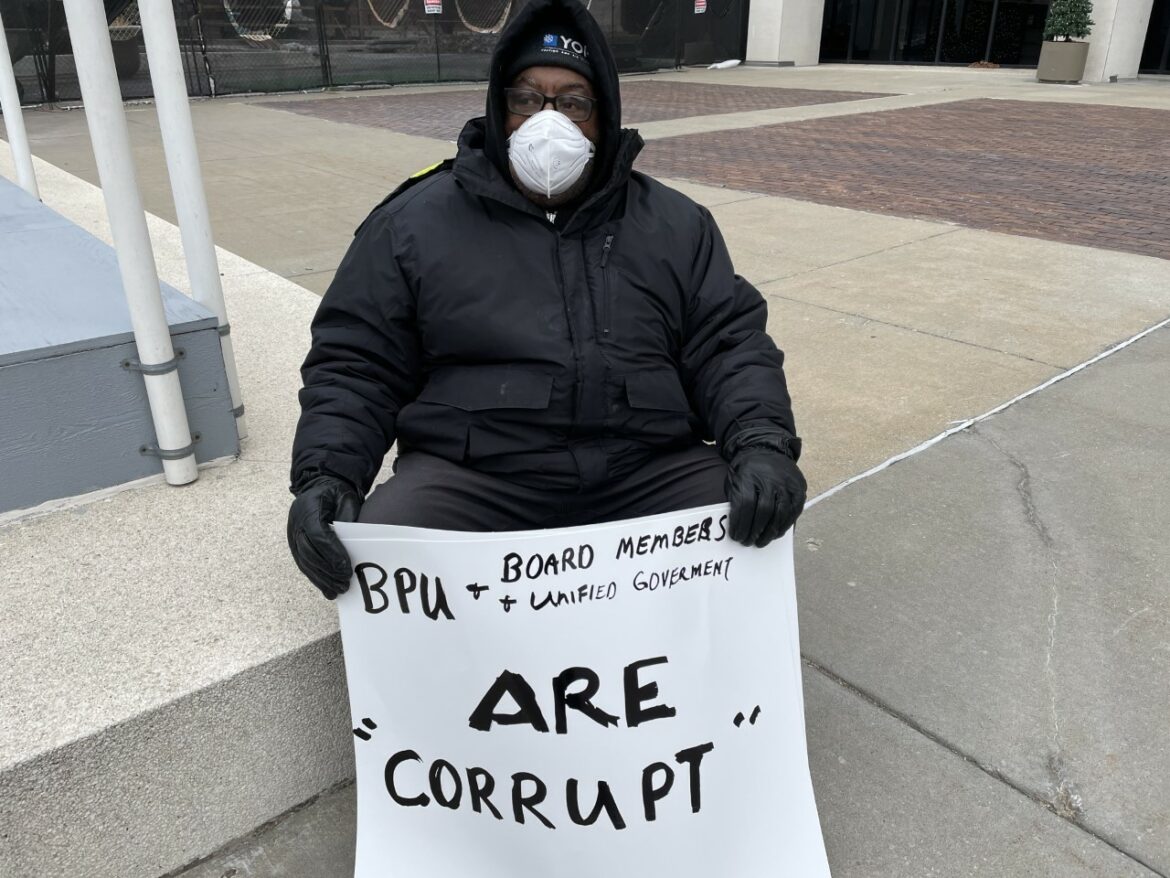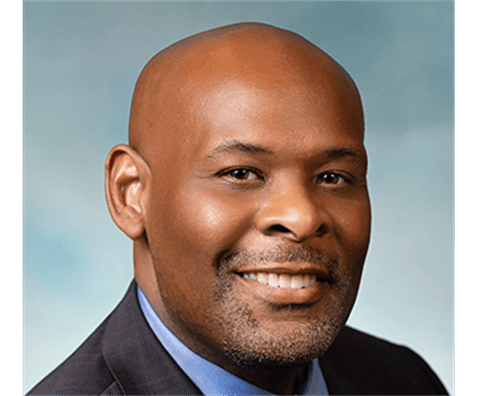Activists Challenge Unified Government/BPU Policies, Fearing Utility Cutoffs Bitter Wind in Wyandotte County
Published December 21st, 2022 at 10:00 AM
Above image credit: Protesters gathered outside of the offices of the United Government of Wyandotte County last Friday to protest additional fees and taxes on their utility bills. (Mary Sanchez | Flatland)A cold Kansas wind nearly ripped the protest poster boards from his grip. But Mack DePriest was determined to keep them aloft outside the offices of the Unified Government in Wyandotte County.
“If you’re out here today, it’s serious,” DePriest said, noting the bitter temperature and nodding to the small crowd that gathered last Friday to protest a variety of grievances. Most of the protests were focused on the policies of the Kansas City Kansas Board of Public Utilities, commonly referred to as the BPU.
“BPU + Board members and Unified Government are Corrupt,” read his sign.
DePriest is among residents challenging the policies of the BPU, a more than 100-year-old nonprofit utility that serves 65,000 electric and 53,000 water customers in Wyandotte County.
A showdown of sorts may occur at the meeting on Wednesday when the six-member board meets at 6 p.m.
Tensions have been mounting for months. And Wednesday’s meeting has become a focal point, in part because the new budget is scheduled to be approved.
Protesters want the budget’s approval delayed until their concerns are addressed.
Utility bills contain too many other taxes and fees from the Unified Government, the protesters said, making it impossible for people to stay in good graces by paying only what they owed for electricity or water.
Instead, the whole bill – including taxes and fees — will be due. And if they are unable to afford the entire bill, they risk disconnection and having no water or electricity.
Issues with the BPU are woven into a range of concerns about local governance.
This year marked the 25th anniversary of voters approving the Unified Government model, merging the city and county.
Mayor Tyrone A. Garner’s ability to set agendas for the Unified Government was undercut in a recent move by other commissioners, an action that angered some of his supporters.
But with frigid temperatures and snow predicted over the long holiday, concerns are rising about how people will remain safe if they can’t afford their bills, and especially if they are already disconnected.

David E. Mehlhaff, chief communications officer with the BPU, said the fact that other city fees and charges are included, like storm water and sewer, isn’t a decision made by the BPU.
“That is entirely a decision by the Unified Government,” Mehlhaff said. “We work hard with trying to extend more payment arrangements.”
If the Unified Government decided to separate the bills, it would have to create another billing system, which would come at an extra cost, he noted.
The utility kept its moratorium on shutoffs during the pandemic for months longer than other utilities, Mehlhaff said. It also has hot and cold weather rules that restrict cutoffs in severe conditions.
The BPU has not had a rate increase since 2018, when electric rates were raised 4%, and it does not anticipate raising rates this year, Mehlhaff said.
But from the activist viewpoint, BPU officials are often painted as callous, intent on functioning as debt collectors instead of being an agency seeking to help residents find solutions for their struggles to keep up with utility bills.
Federal help is available, but residents have difficulty navigating the application processes, said Ty Gorman.
Gorman, a Wyandotte County resident, is a national representative with the Kansas Sierra Club Campaign and is among advocates pressing the BPU to change its policies.
Gorman cites industry best practices that consider packing of extra taxes and fees on utility bills as regressive.
“It’s an example of bad public finance practices,” he said. “It happens more often in low-income communities, and it can lead to evictions and houselessness.”
DePriest, a certified technician, said he often works on people’s heating and cooling systems, so he hears the stories and has his own of clients unable to pay what they owe him.
“I go to these people’s houses,” he said. “They often can’t pay me either, even half of what they owe would be good for me to receive.”
One Household’s Burden, Another’s Convenience
On its website, the BPU promotes its billing practices as “user-friendly.” The utility claims its new design has “more detail and is easy to understand.”
A section of the utility’s website details the single monthly bill for electric water, sewer and garbage pickup.
“This way you don’t have to keep track of so many separate bills, which is common in other cities,” the website states.
Community advocate Louise Lynch said that it’s the other Unified Government fees and compounding late charges that quickly overwhelm low-income residents or people who face other unexpected household costs, like medical emergencies.
A $500 monthly bill isn’t uncommon, several activists said, with the looped in fees for other Unified Government costs.
The rates charged are not the contention, nor are they out of line with what other local services charge, like Evergy, Gorman said.
In previous emails with the community advocates, the utility disclosed that in December 2021, there were 2,739 service disconnections. And in January 2022 the number of disconnections was 1,475.
Mehlhaff, BPU’s chief communications officer, said that it’s difficult to track shutoffs because households often shift off and on, with people paying enough online to have services restored, even temporarily until they are at-risk of shutoff again.
“They usually find ways to get back on pretty quickly,” he said. “There are a lot of organizations out there helping folks.”
The ability of a resident to pay, based on their income, is one factor that the utility needs to be more transparent about in its policy, Gorman said.
Wyandotte County residents pay a far higher percentage of their income than would be advised. The issue is partly due to poverty rates, but it is exacerbated by a lack of coordination with gaining them energy assistance, he said.
“We need the board to commit to not put people’s lives in danger,” Gorman said. “But we need the commission to get the fees off the bill and change the charter to hold the BPU accountable for their processes and spending.”
‘A People’s Mayor‘
A cheer erupted from the crowd of protesters gathered outside of the Unified Government offices when Mayor Tyrone Garner emerged from the building.
He addressed them briefly, noting their disagreement with how commissioners shifted his role in setting agendas. There are 11 commission members, including the mayor.
The previous evening, Unified Government commissioners voted 9-1 to shift how much power the mayor holds in setting agendas. The change affects how issues pass through standing committees and reach the full commission for a vote.
“What happened was an attack on Wyandotte County,” Garner said of the change. “I’m going to be committed to the people.”

He told the crowd to vote, to stay focused to their demands.
In his December annual report, Garner noted the 25th anniversary of the Unified Government.
“We are at a critical crossroads where we stand today in Wyandotte County,” Garner said, as reported by KC Hispanic News. “A crossroad that offers us the opportunity to move away from business-as-usual and to take the clear choice of working collaboratively to reimagine and improve Wyandotte County together.”
To advocates like (Louise) Lynch, it’s past time for some changes.
“They have put this entire county at risk of being controlled by the very few,” Lynch said.
She contacted other groups including the ACLU of Kansas for help, hoping to investigate BPU and Unified Government practices.
Lynch believes that when the other commissioners altered the rules for how the mayor sets the agenda, they overstepped legal boundaries.
Lynch said that she has areas of disagreement with the mayor. But Garner is “the people’s mayor” because he is willing to listen to constituents.
“They have blocked him every single step of the way,” Lynch said. ‘The people know that he is trying. And that is all that they ask for.”
Mary Sanchez is senior reporter for Kansas City PBS.



These taxes need put on the property tax bill, where they belong.